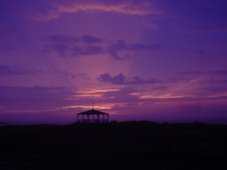Each morning when I turn on my computer, I hear a clip from the BBC audio of 'Hitchhiker's Guide To The Galaxy', Vroomfondel shouts at me, “We demand guaranteed, rigidly defined areas of doubt and uncertainty.” It reminds me what my job isn’t.
"You just let the machines get on with the adding up," warned [the other philosopher], "and we'll take care of the eternal verities thank you very much. … Under law the Quest for Ultimate Truth is quite clearly the inalienable prerogative of your working thinkers. Any bloody machine goes and actually finds it and we're straight out of a job aren't we? I mean what's the use of our sitting up half the night arguing that there may or may not be a God if this machine only goes and gives us his bleeding phone number the next morning?"
"That's right!" shouted Vroomfondel, "we demand rigidly defined areas of doubt and uncertainty!"
Unitarian Universalism is a faith tradition that utilizes many different maps along our journey. We utilize many different sources of wisdom – Hebrew scripture and Jewish history and tradition and Christian scripture and tradition (from which our own roots sprang), the wisdom of world religions, science, humanism, native and earth based traditions; our own direct experience of transcending mystery and wonder, and the example of prophetic men and women.
This year, October has brought a confluence of sacred moments from many religious traditions. In the midst of religious conflict and violence, some of the spiritual traditions we look to for wisdom share a connection that will happen for the next two years, then not again for thirty.
The sacred Muslim lunar month of Ramadan and the sacred Jewish lunar month of Tishrei, which includes the High Holy Days and Sukkot, both began in early October. October 2 was Worldwide (Protestant/ Orthodox) Communion Sunday and Gandhi's birthday, and October 4 was the Feast Day of St. Francis of
One of the challenges of Unitarian Universalism is that while we pull truths from various traditions and spiritual paths, it is very hard to avoid getting caught up in defining ourselves by the bits of doctrine, creed, or belief we don’t hold. Defining ourselves in the negative. When we do this, we miss the values and principles we share in common. We miss the moments of sacred connection that exists within and among different faith traditions, including ours, when we focus on what isn’t rather than what is.
Also on my computer is taped a small paper with an instruction I try to keep in the front of my mind to remind me what I intend to do, to describe my intention for living. If it could be said that I meditate, this would be what I meditate upon.
“I am determined to cultivate only thoughts that increase trust and love, to use my hands to perform only deeds that build community, and to speak only words of harmony and aid.” Thich Nhat Hanh
Opportunities for sacred community is what brings us here, together. Sometimes we call the most immediate draw “the music,” sometimes we call it “the religious education program,” or “the sermons,” sometimes we call it “shared values.” But the bottom line, if we listen to one another closely enough, is that we come here for sacred community. To find the G-dness in one another and between us. To find the moments of holy sharing.
Our RE kids share sacred community as they explore different ways various faith traditions express the sacred. Our 2nd and 3rd graders are studying Judaism this month, in an age appropriate way, by exploring the meaning of sacred holidays.
Celebrating Sukkot, by Nick H. and Isabelle H.
Sukkot is a Harvest celebration for Jewish people. We learned that you have a big feast with a lot of good stuff, like bread called Challah, lemon bread, and cookies. You make a bouquet of dried flowers called a lulav, which you hold in your right hand, and you hold a lemon in your left hand, and you say a blessing, and wish everyone Shalom, which means peace. You also take sliced and cored apples and hang them on a string to dry.
Our 7th graders are also studying Judaism this last month. They attended a Rosh Hashana celebration and services at the Jewish Community of Amherst. They’re talking about the idea that G-d chose a special group to be G-d’s people and formed a covenant with them, that G-d would behave in certain ways and the people would behave in certain ways.
Our 4th and 5th graders are learning about the historical Jesus– the Jewish Jesus who was a man of his time and community as we can understand it from science and archeology. K/1 is working on being friends with one another and exploring what does it mean to be friends, the 6th graders are getting creative, building and making stuff together, and the COAers are working that same thing out with one another all over again – What does it mean to be a community of seekers?
These groups all find moments of sacred community together as they share and work together in our RE classes. As they grow and develop intellectually, the questions change, but the journey remains the same. We don’t demand “guaranteed, rigidly defined areas of doubt and uncertainty.” We don’t make any proscriptive demands of creed or belief, positive or negative. We don’t demand at all. Our covenant together is descriptive. We describe how we will be together on this journey of exploration – that “we will use our hands to perform only deeds that build community, and to speak only words of harmony and aid.”


No comments:
Post a Comment